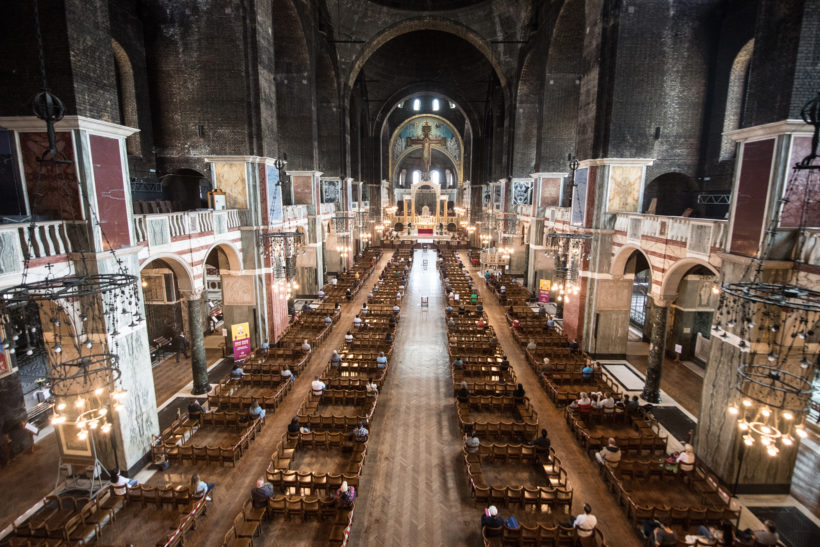
Socially distance church services resumed after the first UK lockdown, but all but private worship is now outlawed until December 2.
redo Jump to...
print Print...
(by Andrea Morris, CBN News) – More than 100 church leaders are taking legal action against the English and Welsh government for forcing houses of worship to cease in-person Sunday services due to another COVID-19 lockdown in the UK.
The pastors say the restrictions on public worship violate Article 9 of the [UK] Human Rights Act on the freedom to express religious beliefs.
The Christian Legal Centre represents the group and argues that these actions by both governments prevent worship while still leaving religious locations open for secular activities.
“The English and Welsh Governments have now introduced two successive sets of lockdown measures which have completely prohibited and criminalized public communal worship, a core aspect of religious life for the Claimants and their congregations,” the claim reads.
“With these measures, the Governments have inflicted a terrible human cost, without rigorous consideration of less onerous restrictions, and as part of a package which leaves places of worship open for secular activities.”
Places of worship were ordered to shut down in March, then allowed to reopen in June to begin holding socially distanced public services. The latest lockdown only permits churches to be open for small funerals and individual prayer.
But the church leaders say canceling Sunday services again is unreasonable because houses of worship have implemented procedures that comply with COVID-19 guidelines that reduce the risk of spreading the virus.
Pastor Ade Omooba MBE, who is leading the court challenge, said, “We have been left with no alternative but to pursue a judicial review on this crucial issue and at this significant moment for the freedom to worship in church in this country. We call on the government to recognize the vital importance of church ministry and the principle of church autonomy from the state.”
And the former Bishop of Rochester, Michael Nazir-Ali, emphasized that pastors recognize the dangers associated with the pandemic but defending religious liberty is paramount.
“The principle of the freedom of worship needs to be maintained and churches have been assiduous in maintaining safety in buildings and among worshippers,” he said. “There is widespread unease among many church leaders about the lack of evidence and consultation regarding the ban on collective worship.
“Church leaders see collective worship not as an optional extra but as vital to the mental and spiritual health of believers, especially for the lonely and vulnerable.”
Some government officials, who have discussed COVID restrictions throughout the pandemic, wrote to the British Prime Minister Boris Johnson to point out that there is no scientific evidence that justifies canceling in-person services again, considering the measures that churches have taken to remain safe.
Former UK Prime Minister Theresa May also expressed concern regarding the government’s policy.
“My concern is the government today making it illegal to conduct an act of public worship for the best of intentions, sets a precedent that could be misused for a government in the future with the worst of intentions. It has unintended consequences,” she said.
Published at CBNNews .com on November 16. Reprinted here for educational purposes only. May not be reproduced on other websites without permission from CBN News.
Questions
NOTE: Before answering the following questions, read the info under “Background” and watch the video under “Resources” below.
1. List the who, what, where and when of the news report.
2. On what grounds are the church leaders taking legal actions against the English and Welsh governments?
3. a) What does the Christian Legal Center emphasize about the the governments’ ban on in-person worship services?
b) What does the claim state?
4. For how long were places of worship first locked down by the government?
5. a) Why do church leaders say the government’s renewed ban on Sunday services is unreasonable?
b) What do you think? Can churches implement the proper procedures required to reduce the risk of spreading coronavirus the way a grocery store, Walmart, Target, or pharmacy can? Explain your answer.
6. What are the church leaders calling on the government to do, according to Pastor Ade Omooba?
7. Former Bishop of Rochester, Michael Nazir-Ali, emphasized that pastors recognize the dangers associated with the pandemic but defending religious liberty is paramount. He also explained, “Church leaders see collective worship not as an optional extra but as vital to the mental and spiritual health of believers, especially for the lonely and vulnerable.” Do you agree with the church leaders on the importance not only of protecting religious liberty but on the necessity of collective worship? Explain your answer.
Background
The Human Rights Act 1998 is an Act of Parliament of the United Kingdom which received Royal Assent on November 9, 1998, and mostly came into force on October 2, 2000. Its aim was to incorporate into UK law the rights contained in the European Convention on Human Rights.
Daily “Answers” emails are provided for Daily News Articles, Tuesday’s World Events and Friday’s News Quiz.



